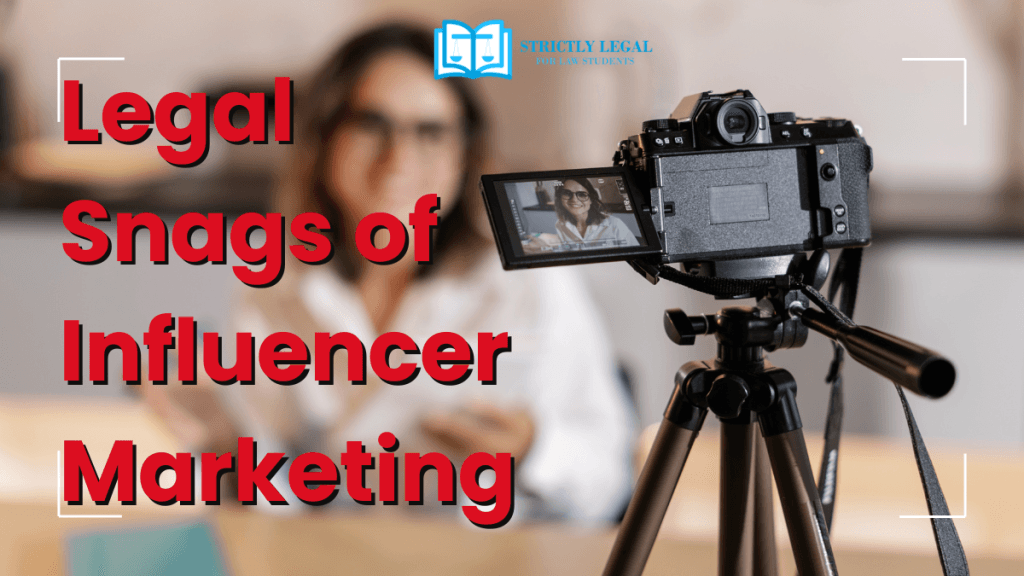Content creators are a vital resource for organizations looking to expand their audience in the quickly changing realm of social media marketing. Influencers successfully help brands communicate their ideals, get noticed, establish credibility, and eventually increase sales. Influencers are an essential business resource for brands, and content creators must realize that they are more than just a marketing tool. In fact, content producers are a company and a brand unto itself. Influencer marketing has taken the advertising world by storm. As social media platforms like Instagram, TikTok, and YouTube dominate the digital space, brands are increasingly turning to influencers to promote their products and services. However, while influencer marketing can be incredibly effective, it’s also fraught with legal risks that both brands and influencers must navigate carefully. From misleading endorsements to intellectual property disputes, the legal landscape surrounding influencer marketing is complex. Influencers and all other businesses have legal obligations. The same laws that apply to larger organizations also apply to content providers. Influencers must thus understand their business responsibilities in order to stay out of trouble with the law. The three most frequent errors made by content producers will be covered in this post along with tips for avoiding them.
Table of Contents
Copyright Issues: Who owns the content?
Content creation is the lifeblood of influencer marketing, but it can lead to some sticky intellectual property (IP) issues. Many influencers create stunning visuals, videos, or written content that brands may want to repurpose. But who owns that content, and who can use it? Influencers frequently incorporate popular music, photos, and videos into their posts. Many materials are protected by copyright law and require authorization from the copyright holder, even if some may be freely accessible to the public. Content producers may lose thousands of dollars if their music, photos, or films are used improperly.
A particular kind of intellectual property right over an original piece of authorship is a copyright, which gives the owner the sole authority to copy, distribute, modify, and exhibit the work in public. Section 14 of the Copyrights Act, 1957 describes it all as to what all are protected under the act such as; Music, pictures, films, and concrete, artistic manifestations of ideas are all protected by copyrights. Influencers who lack a proper understanding of copyright law may face serious legal problems.
Music
Music is frequently used by influencers to create content. However, using music incorrectly, like in an Instagram “reel,” might be a costly error. Influencers, for instance, are permitted to use “suggested music” on Meta’s Instagram, but not in posts that were produced as part of sponsored collaborations with sponsors. This is due to the fact that Meta’s music library contains both music that is royalty-free and music that needs a copyright holder’s license. Therefore, even though a content creator may be free to use a song for non-commercial purposes, using the same song for commercial purposes would probably be considered copyright infringement, exposing the content creator to legal repercussions, including lawsuits for copyright infringement and a requirement to pay the copyright holder money.
Photos and Videos
Influencers create content using images and videos as well. The person who developed the image or video or who has obtained the rights to it from the copyright holder is often the one who is in possession of the copyright. It is common for influencers to believe that online image and video content is freely accessible, however this is typically not the case. Influencers should use caution while using photos and videos in posts so as not to violate other people’s copyrights.
Fair Usage
Content producers who want to advance should consult a lawyer to make sure their posts adhere to copyright regulations. Determining whether copyright infringement is legally applicable or if the fair use exception to copyright law applies can be particularly difficult when it comes to copyright law. Under the fair use exception, copyrighted materials may be used for a variety of purposes, including education, criticism, and commentary. It is a complex area of law where a lawyer must be able to successfully guide clients and help them figure out how to prevent their work from being used without authorization. Through intelligent business practices that prevent needless controversies, lawyers will assist content creators in navigating these difficulties effectively and affordably, which will help them build and safeguard their brand.
False Advertising and Misleading Claims
Influencer marketing often revolves around endorsements that can create powerful narratives for consumers. However, both brands and influencers need to be cautious not to make false claims about products or services. Because it encourages trust, engagement, and authenticity, successful influencers produce branded material that appears natural. Influencer marketing and compensated collaborations, however, are subject to the same regulations as commercials. Influencers and businesses alike are required to declare paid partnerships and advertise honestly. Influencers are required by the Federal Trade Commission (FTC) to reveal any significant relationship they may have with a brand, including whether they have been compensated. Payment in cash, free merchandise, and other incentives like revenue sharing or brand ambassadorships are all examples of compensation. The FTC also has a MoU with the Indian Government to protect consumers and promote competition.
The majority of social media sites also mandate that content creators reveal paid collaborations through their terms and conditions in order to promote FTC compliance. A content producer who depends on a handle to do business would undoubtedly suffer greatly if they were banned for failing to disclose paid collaborations. In order to protect their hard-earned reputations and account handles, influencers can benefit from seeking legal advice to ensure compliance with basic advertising standards.
The FTC prohibits deceptive advertising practices under the FTC. These statements also violate the Lanham Act’s strict language against deceptive and false advertising. The FTC does not allow content creators to make strong, unsupported claims for the promotion of goods and services, therefore it is important for them to know what kinds of claims they may and cannot make. Companies frequently find themselves in hot water due to false claims regarding the efficacy of skincare products (Estee Lauder’s false advertising and corrected advertising surrounding its anti-aging products), diet programs, and hair care products (Organix (OGX) paid a multi-million dollar settlement for mislabeling products as “natural”).
Endorsement of Dangerous Products or Services
Some brands might want to partner with influencers to promote risky or controversial products, such as vaping products, weight-loss supplements, or controversial health treatments. While such products can generate high engagement, they also raise serious legal issues.
Products like tobacco, alcohol, and weight-loss products are highly regulated. The use of influencers to promote such products can quickly attract attention from regulators like the FDA, FTC, or even state health agencies. Even if legally compliant, promoting controversial products can backfire, potentially damaging the reputation of both the brand and the influencer.
Before entering into any agreement with influencers, ensure that the product is legally compliant in all markets where the promotion will take place. Avoid promoting products that could harm the health or safety of consumers. Even if a product is legal, it should be found out whether it aligns with the values of the influencer and their audience. An influencer’s reputation can be seriously affected if they promote something that contradicts their personal brand or public image.
Working without a Contract
Influencers that are successful have solid contracts. Because they give agreements between parties a precise, legally binding framework, contracts are essential. They provide reciprocal responsibilities and safeguard the interests of all parties, which lessens the possibility of conflict. Using emails, text messages, or invoice transactions as a contract would unavoidably harm your company and cost you millions of dollars. Content producers should also exercise caution when entering into agency contracts without legal representation. In the case of a breach or a reputational crisis, influencers have little to no redress under agency contracts, which are typically incredibly one-sided and grant agencies sole rights to content. Clauses pertaining to content ownership, payment conditions, non-disparagement, and jurisdiction in the event of a breach should be carefully considered by content creators. Please read our article on influencer contract considerations for additional details.
Conclusion
Influencer marketing is an incredibly powerful tool, but it comes with significant legal risks for both brands and influencers. By understanding and following the key legal guidelines—such as the FTC’s disclosure rules, intellectual property rights, and the risks of misleading claims—brands and influencers can avoid common pitfalls and create successful, legally-compliant campaigns.
Ultimately, transparency, honesty, and a clear understanding of the law are crucial to a positive and legally sound influencer marketing partnership. Whether you’re a brand looking to boost your visibility or an influencer aiming to build a long-term, trustworthy following, staying informed and ethical is key to your success in the space.

Law student.
Turning legal insights into engaging narratives.





